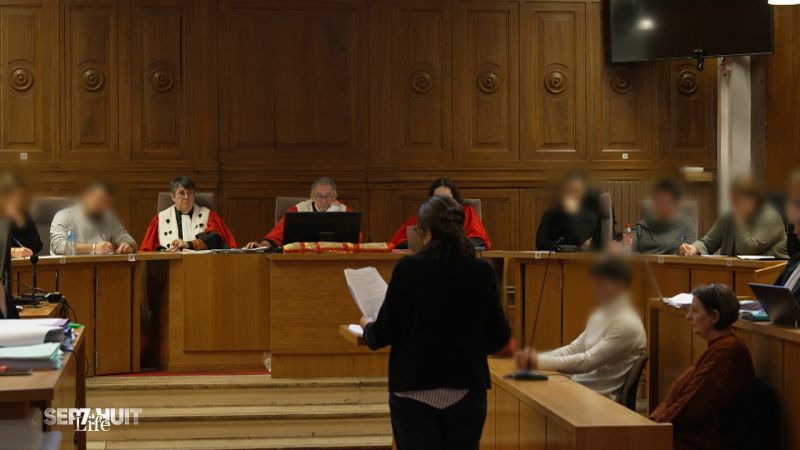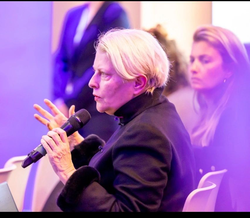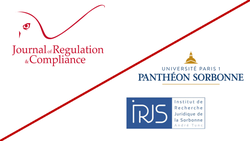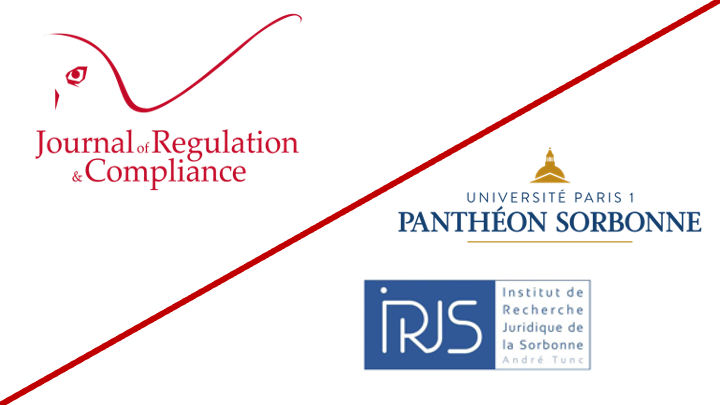The recent news
March 23, 2025
Law by Illustrations

🌐suivre Marie-Anne Frison-Roche sur LinkedIn
🌐s'abonner à la Newsletter MAFR Regulation, Compliance, Law
🌐s'abonner à la Newsletter en vidéo MAFR Surplomb
► Référence complète : M.-A. Frison-Roche, "Pour juger un acte, il faut plonger dans les récits contradictoires des uns et des autres. En cela tout procès est "atypique"🎬documentaire Le procès", billet mars 2025.
____
___
Le procès est un documentaire, diffusé sur TF1 le dimanche 23 mars 2025. Il porte sur un procès pour meurtre qui se déroule devant la Cour d'assises du Gard. Celui-ci est présenté comme "atypique", en ce que la victime y semble presque absente, son objet étant davantage la relation entre l'auteur du meurtre et sa mère (I). Il en ressort que juger des actes, celui du fils mais aussi celui de la mère, suppose la reconstitution crédible des faits, ce qui suppose aussi de comprendre les êtres humains impliqués (II). Tout procès est ainsi construit, mais l'on peut affirmer aussi que tout procès est atypique (III). Ce que la passion des algorithmes doit considérer.

I. UN DOCUMENTAIRE SUR UN PROCES D'ASSISES ATYPIQUE : SON OBJET EST LA RELATION ENTRE L'AUTEUR DU MEURTRE ET SA MÈRE
La chaine présente le documentaire : "vous verrez le procès comme si vous y étiez".
Le procès d'assise qui est déroulé à la Cour d'Assises de Nîmes est présenté dans l'ordre chronologique, la voix off rappelant quelques règles élémentaires, par exemple la désignation des jurés.
Il est aussi présenté comme "atypique", car le sujet n'est pas tant le meurtre lui-même mais les rapports entre l'auteur du meurtre et sa propre mère, qui est la compagne de la victime. En effet, le fils soutient qu'il a battu avec une batte de base-ball celui-ci pour le dissuader de continuer à battre sa mère et que, descendant de la chambre après l'avoir battu, il en informe sa mère. Mais sa mère a une version différente des faits, pour justifier notamment le fait qu'elle ne se soit pas déplacée pour aller voir l'état de la victime, affirmant qu'elle n'a pas vu cette batte.
Les psychiatres confirment ce caractère atypique en raison de la relation entre la mère et le fils, celui-ci ne pouvant assumer le rôle de protecteur qu'on exige de lui. Le psychiatre observe que la perte de contrôle que traduit le geste en est la conséquence.
Quant à elle, la mère dit qu'elle n'avait pas compris ce qui se passait. Elle est elle-même poursuivie pour délit de non-assistance à personne en danger.
Le documentaire considère que le sujet est donc la relation entre la mère et le fils, Cette relation est décrite comme fusionnelle, le fils étant instituée comme chef de famille tandis que la mère est dans un état de dépression permanente. Les témoins décrivent la mère comme étant "toxique", ne concevant pas que son fils puisse exister en dehors d'elle, le fils se sacrifiant. Des témoins considèrent que la mère serait manipulatrice.
II. JUGER UN ACTE SUPPOSE LA RECONSTITUTION CRÉDIBLE DES FAITS ET DE COMPRENDRE LES ETRES HUMAINS IMPLIQUÉS
Ce cas ainsi exposé montre d'une façon extrême que l'on ne peut juger les actes (le meurtre par le fils, la non-assistance à personne en danger par la mère).
La question de preuve, et les qualifications qui en découlent, est la suivante : celle des intentions. En effet, l'intention de tuer est en cause, l'avocate de l'accusé demandant pendant l'audience la requalification en blessures mortelles ayant entrainé la mort sans l'intention de la donner. De la même façon, l'intention de la mère de ne pas agir, voire l'intention d'utiliser son fils.
L'écoute des questions, des réponses, montre la difficulté de reconstituer ce qui est exact, ou à tout le moins crédible, dans les faits évoqués par les personnes, et plus largement les récits articulés par les uns et les autres.
Il ressort des uns et des autres que c'est le récit global de la mère qui est le moins crédible.
III. UN PROCÉS ATYPIQUE, DES EXIGENCES ET MÉTHODES PROBATOIRES COMMUNES
Ce que l'on peut retenir dans ce que ce documentaire porte sur la crédibilité des récits.
En effet, comme le rappelle l'Avocat général : "on n'est jamais dans la tête des gens". C'est pourquoi l'Avocat général récuse avec force la demande de requalification et rappelle la définition juridique de l'intention criminelle.
De la même façon, l'avocate de la mère rappelle que celle-ci n'est pas poursuivie pour avoir été une "mauvaise mère". Elle a sans doute une "responsabilité morale", qu'elle a reconnue, mais elle n'a pas de responsabilité juridique, l'avocate soulignant qu'il ne faut pas confondre Droit et Morale.
Ce qui est remarquable est qu'à ce titre ce procès qui est présenté comme "atypique" est comme tous les autres procès, non seulement les procès pénaux mais les procès civils.
Cet entrechoc des récits est ainsi raconté par Eliette Abécassis à travers son roman Divorce à la française.
______
March 19, 2025
Interviews

🌐suivre Marie-Anne Frison-Roche sur LinkedIn
🌐s'abonner à la Newsletter MAFR Regulation, Compliance, Law
🌐s'abonner à la Newsletter en vidéo MAFR Surplomb
____
► Référence complète : M.-A. Frison-Roche, «Les juristes ont le pouvoir et le devoir de dire Non à Trump » », interview réalisée par Olivia Dufour pour Actu-juridique, Lextenso, 19 février 2025
___
► lire l'entretien : 💬 Lire l'interview
🌐lire la présentation de l'entretien sur LinkedIn
____
► présentation de l'entretien par Actu-Juridique : La tension monte entre Donald Trump et la justice américaine. Alors que le président a demandé la destitution d’un juge qui avait prononcé la suspension d’une expulsion de migrants, le président de la Cour Suprême a rappelé mardi dans un communiqué qu’il existait une procédure d’appel quand on n’était pas satisfait d’une décision de justice. Donald Trump s’en prend aussi aux avocats. Face à cet exécutif apparemment tout-puissant, les juristes ont-ils suffisamment de pouvoir pour faire respecter l’État de droit ? Oui, estime le professeur Marie-Anne Frison-Roche.
____
Q. Depuis son entrée en fonctions, Donald Trump se positionne au-dessus du droit dans un pays qui pourtant accorde à celui-ci un pouvoir déterminant. Les juristes sont-ils en capacité de résister ?
Résumé de la réponse de MAFR : El
Q. De quels outils disposent-ils ?
Résumé de la réponse MAFR : l'
Q. Les juges peuvent bien invalider les décisions de l'exécutif, c'est celui-ci qui finalement les exécute. Ou pas. N'est-ce pas une limite insurmontable au contrepouvoir des juges ?
Résumé de la réponse MAFR : Le
.
_________
March 11, 2025
Conferences

🌐follow Marie-Anne Frison-Roche sur LinkedIn
🌐subscribe to the Newsletter MAFR Regulation, Compliance, Law
🌐subscribe to the Video Newslette MAFR Surplomb
____
► Full Reference : M.-A. Frison-Roche, "Le juriste, requis et bien placé pour le futur" (The lawyer needed and well placed for the future), in Groupe Lamy Liaisons, Les Éclaireurs du Droit, Hôtel de l’Industrie, Place Saint Germain des Près, Paris, 11 March 2025, 16h.
____
This speech opens a series of 4 workshops on the following themes:
- The challenge of Trust
- The challenge of Risk
- The challenge of Transmission
- The challenge of leadership
____
🧮see the full programme of this manifestation (in French)
____
⬜see the slides basis made for this speech (which were not projected) (in French)
____
🎥 watch the short video made after the conference (in French)
____
► English Summary of this introductory conference: The 4 sessions will address the successive themes of trust, risk, transmission and leadership, which legal professionals are facing, particularly as a result of algorithms.
For an introductory analysis, it is possible to make a distinction inside the Future.
The future has a part of Stability: the jurist can contribute to this stability, i.e. the preservation of the past (I).
The future has an part of Predictability: the lawyer must increase this part in the present itself (II).
The future has a part of radical novelty (III): at this point, which may correspond to a precipice, if no one had imagined it, the lawyer can also be there. Until now, we think of lawyers more in the first 2 hypotheses, less in this one. Is it pertinent?
In each of these dimensions, the algorithmic system (AI) is presented as replacing or dominating the human.
In each of these 3 dimensions, Lawyers must be present, as they form a community that must remain united around the very idea of Law (algorithms do not conceive ideas, it is humans who transmit them to other humans, and the algorithmic system must remain a medium).
As far as the Stability of the future is concerned, the Lawyer can and must contribute to it, in particular through Transmission, because there is less of a blank page as algorithmic 'creation' is based on past data, and training, where the human being will be all the more central as machines have to be handled.
As far as the Predictability of the future is concerned, it is a question of assessing the Risks, whether specific or systemic, legal or non-legal, in order not to take them or on the contrary to take them. The more the Lawyer is involved in risk-taking, the more he or she will be in the right place, before and during the action.
As far as the Radically New future is concerned, it is not easy to qualify AI as such or not, but now the possible disappearance of the Rule of Law in the United States is one of them. All Lawyer are expected. Every lawyer must have two virtues (which the algorithm cannot not have): the virtue of Justice and the virtue of Courage. It is these virtues that we must pass on and share.
____
Current events have led me to devote the time available to me to focusing on a single perspective, the third, to say what is expected of Lawyers if we perceive something radically new in the near future, what everyone does.
Indeed, in the United States, on the one hand there is a head of state for whom the Law does not exist and who uses the power of regulation to express his absolute indifference to other states, companies and human beings, and on the other an entrepreneur who claims that he is going to become the master of algorithmic technology, a system over which he already wields great power.
Faced with this Radical Novelty, we expect the community of Lawyers, all lawyers, whatever their place, their technical mastery, their level, their nationality, to speak out and say No. As Kelsen, Cassin or Ginsberg did. Say No and help others to say No. To do this, Lawyers, as human beings who care about other human beings, must be aware of the twofold virtue expected of them: the virtue of commitment to Justice and the virtue of Courage.
________

Updated: March 5, 2025 (Initial publication: June 13, 2023)
Publications

🌐follow Marie-Anne Frison-Roche on LinkedIn
🌐subscribe to the Newsletter MAFR Regulation, Compliance, Law
🌐subscribe to the Video Newsletter MAFR Surplomb
____
 ► Full Reference: M.-A. Frison-Roche, The role of will in the Compliance Obligation: Obligation upon Obligation is valid and useful, Working Paper, June 2023.
► Full Reference: M.-A. Frison-Roche, The role of will in the Compliance Obligation: Obligation upon Obligation is valid and useful, Working Paper, June 2023.
____
🎤 This working paper was originally drawn up as a basis for the talk, Obligation on Obligation is worth, on the first day of the conference I co-organised:🧮Compliance : Obligation, devoir, pouvoir, culture (Compliance: Obligation, duty, power, culture), on 13 June 2023.
____
It was subsequently used as the basis for a forthcoming article:
📝La part de la volonté dans l’obligation de compliance : Obligation sur Obligation vaut".
in📕L'obligation de compliance, in the collection 📚Régulations & Compliance
📝The role of will in the Compliance Obligation: Obligation upon Obligation is valid and useful,
in📘Compliance Obligation, in the collection 📚Compliance & Regulation
____
► Summary of this Working Paper: The demonstration of the part played by the entreprises' Will in the Compliance Obligation incumbent on them is carried out in 3 stages.
The first stage of the demonstration consists in finding the part played by the free will of companies in their Compliance Obligation by putting an end to two confusions: the first which, within the Law of Contract and Tort itself but also within Compliance Law, splits and confuses "free will" and "consent", which would no longer require freely expressed acceptance; the second, specific to Compliance Law, which confuses "Compliance" and "conformity", reducing the former to mechanical obedience which could exclude any free Will.
Having clarified this, the rest of the study focuses on the 2 ways in which a company subject to a Compliance Obligation by compulsory regulations expresses a part of its free Will, which the study expresses in this proposed adage: Obligation upon Obligation is valid, since the legal obligation to which the company responds by the obedience owed by all those subject to the regulations may be superimposed by its free Will, which will then oblige it.
The first case of Obligation upon Obligation, studied in a second part, concerns the means by which the compulsory Compliance Obligation is implemented, the company subject to the Monumental Goals set by the Legislator remaining free to choose the means by which the company will contribute to achieving them. Its free Will will thus be exercised over the choice and implementation of the means. This can take two legal forms: Contracts on the one hand and "Commitments" on the other.
In the third part, the second case of Obligation upon Obligation, which is more radical, is that in which, in addition to Compliance's legal compulsory Obligation, the company draws on its free Will to repeat the terms of its legal Obligation (because it is prohibited from contradicting it), a repetition which can be far-reaching, because the legal nature (and therefore the legal regime) is changed. The judgment handed down by the The Hague Court of Appeal on 12 November 2024, in the so-called Shell case, illustrates this. What is more, the company's free Will can play its part in the Compliance Obligation by increasing the legal Obligation. This is where the alliance is strongest. The interpretation of the specific and diverses obligations that result must remain that of the Monumental Goals in a teleological application that gives coherence to the whole.
____
🔓read the developments below⤵️

Updated: Feb. 25, 2025 (Initial publication: Dec. 2, 2023)
Publications

🌐follow Marie-Anne Frison-Roche sur LinkedIn
🌐subscribe to the Newsletter MAFR Regulation, Compliance, Law
🌐subscribe to the Video Newsletter MAFR Surplomb
____
 ► Full Reference : M.-A. Frison-Roche, Compliance, Vigilance and Civil Liability: put in order and keep the sense of Reason, Working Paper, June 2024
► Full Reference : M.-A. Frison-Roche, Compliance, Vigilance and Civil Liability: put in order and keep the sense of Reason, Working Paper, June 2024
____
📝 In its French version, this Working Paper is the basis of the contribution "Compliance, Vigilance et Responsabilité civile : mettre en l'ordre et raison garder", in 📕L'Obligation de Compliance
____
► Summary of this Working Paper: The descriptions of the Liability incurred by large companies as a result of their compliance obligations are very diverse, even contradictory, going beyond the wishes that may be expressed as to what this liability should be. The first part of this study therefore sets out the various liabilities incurred by companies, which differ in the conditions under which they are implemented and in their scope, so as not to confuse them.
Indeed, as the various laws establish specific legal compliance obligations, they give rise to liabilities of varying conditions and scope, and it is not possible to avail of the regime of one in a situation that falls within the scope of another. It is therefore necessary to review the various bodies of compliance legislation, the GDPR, the ALM-FT regulations, the French so-called Sapin 2 law, the French so-called Vigilance law , the European IA Act , the European European DGA Act, etc., to recall the inflexion that each of these bodies of legislation has made to the liability rules applied to the companies subject to them. Nevertheless, the unicity of the Compliance Obligation, overcoming this necessary diversity of situations, regulations and liability regimes, can provide grouping lines to indicate beyond this diversity the extent of the liability incurred by companies.
Once this classification has been made, the second part of the study develops the observation that none of this can create any principle of general liability on large companies in terms of compliance, and in particular not in terms of vigilance. It is not possible to deduce a general principle of specific obligations of liability or specific obligations to reparation, for example in the area of vigilance, as the texts creating specific vigilance obligation refer to the conditions of commun Tort Law (proof damage and causality), and International Public Law does not have the force to generate a general principle binding companies in this respect.
The third part stresses that it is nevertheless always possible to invoke Tort Law, and companies cannot claim to escape this. This may involve contractual liability, a situation becoming increasingly frequent as companies contractualise their legal compliance obligations, reproducing them but also modifying them, and as Vigilance duty is an obligation that goes beyond the specific situations covered by the regulations.
But it is essential, and this is the subject of the fourth part, not to make companies pure and simple guarantors of the state of the world, present and future. Indeed, if we were to transform sectoral compliances into illustrations of what would then be a new general principle, but one that applied only to them, they would consequently exercise the other side of this coin, namely power over others.
____
🔓read the Working Paper below⤵️
Feb. 21, 2025
Conferences

🌐suivre Marie-Anne Frison-Roche sur LinkedIn
🌐s'abonner à la Newsletter MAFR Regulation, Compliance, Law
🌐s'abonner à la Newsletter en vidéo MAFR Surplomb
____
 ► Full Reference: M.-A. Frison-Roche, La qualification juridique du système de noms de domaine comme infrastructure et ses conséquences juridiques ("The legal status of the domain name system as an infrastructure and its legal consequence"), in M.-A. Frison-Roche et G. Loiseau (dir.), Durabilité de l'Internet : le rôle des opérateurs du système des noms de domaine (Sustainability of the Internet: the role of the operators of the domain name system. Compliance and regulation of the digital space). Compliance et régulation de l'espace numérique, 21 février 2025, organisé par le Journal of Regulation & Compliance et l'Institut de la Recherche en Droit de la Sorbonne (André Tunc - IRDJS), 12 place du Panthéon, Paris.
► Full Reference: M.-A. Frison-Roche, La qualification juridique du système de noms de domaine comme infrastructure et ses conséquences juridiques ("The legal status of the domain name system as an infrastructure and its legal consequence"), in M.-A. Frison-Roche et G. Loiseau (dir.), Durabilité de l'Internet : le rôle des opérateurs du système des noms de domaine (Sustainability of the Internet: the role of the operators of the domain name system. Compliance and regulation of the digital space). Compliance et régulation de l'espace numérique, 21 février 2025, organisé par le Journal of Regulation & Compliance et l'Institut de la Recherche en Droit de la Sorbonne (André Tunc - IRDJS), 12 place du Panthéon, Paris.
____
🧮see the full programme of this colloquium (in French)
____
► Summary of this conference: "Domain names" are a technical reality. This technical reality has come to the fore, seeming to have been both little "thought out" and little "conceived" in Law and, perhaps because it is little coveted, Competition Law, which neutralises the concreteness of things and services in order to focus on exchange, hardly qualifies them. It is rather from the 'Competition Policy' perspective that 'domain names' are apprehended. However, Competition Policy expresses wishes and perspectives, while Competition aw must make way for the perspective of Regulatory Law inside the liberal economic system.
Looking at the technicalities of the domain name system, we can proceed in 3 stages.
Firstly, if a domain name is taken in isolation, it may appear as property and/or a projection of a person, and has rightly been described as such by the courts. But domain names only exist in relation to each other, the addressing system on which the Internet itself and the digital space that enables everyone to spread, reach and be reached were built. In this way, they constitute an Infrastructure in their plurality, in a uniqueness (I). The legal system must take account of this technological reality through the concept of Essential Infrastructure, which is well known in Regulatory legal perspective(I).
Secondly, the legal consequences of this legal qualification of Infrastructure must be detailed (II). Regulatory Law does not necessarily imply institutions, a regulatory authority being an indication rather than a criterion. Rather, it requires specific charges, powers and controls to ensure that the Infrastructure is established and operates to fulfill, now and in the future, the function that is crucially expected of it. Because the digital space was born of the Internet, an a-sectional and a-territorial space, Compliance Law, which is an extension of Regulatory Law, outside the sectors and internalised in the crucial operators, is essential as it is appropriate without diminishing the public dimension of the organisation.
Thirdly, the evidential dimension should be emphasised (III). Indeed, because we need to ensure that the Domain Names Infrastructure is always solid and reliable, so as not to risk a systemic failure of the Internet, and therefore of the digital space, we must not remain with the traditional system of burden of proof that rests on the person making the complaint. Because there is a Compliance Obligation, it is up to the crucial operators to credibly show their ability to ensure the technical sustainability of this infrastructure on which the digital space in which we live is based.
It shall be different if the issue is one of non-technical Sustainability, for example that which is linked to a particular societal project, in which the operators of the domain name system are not at the origin and are required on an ad hoc basis because they are in a good position to help the Authorities or because they wish to do so.
_____
Feb. 21, 2025
Conferences

🌐suivre Marie-Anne Frison-Roche sur LinkedIn
🌐s'abonner à la Newsletter MAFR Regulation, Compliance, Law
🌐s'abonner à la Newsletter en vidéo MAFR Surplomb
____
 ► Full Reference: M.-A. Frison-Roche, "La clé de la proportionnalité pour établir l’équilibre des obligations, pouvoirs et droits - Exemple de l’inclusion technique assurée par les opérateurs des noms de domaine" (The key to proportionality in balancing obligations, powers and rights - Example of technical inclusion by domain name operators), in M.-A. Frison-Roche et G. Loiseau (dir.), Durabilité de l'Internet : le rôle des opérateurs du système des noms de domaine (Sustainability of the Internet: the role of the operators of the domain name system. Compliance and regulation of the digital space). Compliance et régulation de l'espace numérique, 21 février 2025, organisé par le Journal of Regulation & Compliance et l'Institut de la Recherche en Droit de la Sorbonne (André Tunc - IRDJS), 12 place du Panthéon, Paris.
► Full Reference: M.-A. Frison-Roche, "La clé de la proportionnalité pour établir l’équilibre des obligations, pouvoirs et droits - Exemple de l’inclusion technique assurée par les opérateurs des noms de domaine" (The key to proportionality in balancing obligations, powers and rights - Example of technical inclusion by domain name operators), in M.-A. Frison-Roche et G. Loiseau (dir.), Durabilité de l'Internet : le rôle des opérateurs du système des noms de domaine (Sustainability of the Internet: the role of the operators of the domain name system. Compliance and regulation of the digital space). Compliance et régulation de l'espace numérique, 21 février 2025, organisé par le Journal of Regulation & Compliance et l'Institut de la Recherche en Droit de la Sorbonne (André Tunc - IRDJS), 12 place du Panthéon, Paris.
____
🧮see the full programme of this colloquium (in French)
____
► Summary of this conference: The domain name operators operate in a liberal system and have internalised the tasks being technically inherent in the very architecture of the Internet, while the Public Authorities, because they recognise this nature, ensure in Ex Ante that there are no global failures.
This translates into a system of obligations. All the more so since domain name operators not only bear multiple obligations but also, by order of the laws and regulations, impose them on others, for example on their co-contractors and users.
It is from this perspective that the Principle of Proportionality, which is central here, must be considered. It is another expression of the legal Principle of Necessity, which must be conceived in terms of goals: what is proportionate is what is necessary to achieve the objective with regard to which the duties and prerogatives are entrusted and/or exercised. This is why it is first necessary to recall and explain what the Principle of Proportionality is with regard to the operators obligations covered by Compliance Law, which goes beyond jurisdictional powers such as sanctions or dispute resolution, to explain the teleological control of obligations and powers (I).
From this practical framework, the most relevant example is the technical obligation of inclusion (II) In the technical sense, Inclusion means that anyone who wants to enter the digital space must be able to do so and must be able to reach those who are there and be reached by others. This gives everyone the right to reach and be reached.
Is it possible to go further and ask for comfort for everyone and equality in this comfort and advantages to rebalance this accessibility? For instance, to know everything about everyone beyond this simple digital adresse? To ask domains names operators to help everyone to develop his/her personality in the digital space, compensating his/her lack of initial chance? This is social and political inclusion. It is not the same thing. It does not have the same sources. It does not follow the same paths. Not the same forces. The Sustainability that is then projected can be cumulative. A distinction has to be made on the one hand, and a link made on the other. Moreover, in the name of mistreated social inclusion, can we mistreat technical inclusion, i.e. exclude a person from the digital space? (III).
________

Feb. 21, 2025
Organization of scientific events

🌐follow Marie-Anne Frison-Roche on LinkedIn
🌐subscribe to the Newsletter MAFR. Regulation, Compliance, Law
🌐subscribe to the Newsletter Surplomb, par MAFR
____
► Full Reference: M.-A. Frison-Roche & G. Loiseau (dir.), Durabilité de l'Internet : le rôle des opérateurs du système des noms de domaine. Compliance et régulation de l'espace numérique (Sustainability of the Internet: the role of the operators of the domain name system. Compliance and regulation of the digital space), Journal of Regulation & Compliance (JoRC) and Institut de Recherche Juridique de la Sorbonne (André Tunc - IRJS), Paris 1 Panthéon-Sorbonne University, 21 Fabruary 2025
____
► General presentation of this symposium: The digital space has been built on and as a system. Its primary interest is of a negative nature: it consists of to be preserved against the prospect of systemic failure, of not collapsing. Like all other systems, this 'Monumental Goal' specific to the digital system justifies resources that incorporate this concern for the future. As with all systems, it integrates and relies on the specific technical nature of this system.
The digital space is largely based on the invention, technology and architecture of domain names. Domain names, as an addressing system, enable users to enter the digital space and find other Internet users. The uniqueness and solidity of the domain name system, entrusted to a single root and decentralisation, makes this community possible for those who use the digital space and ensures the technical durability required, without which the digital space would be compromised.
The architecture, operation, operators and what they do under the control of legislators, regulators, judges and legal subjects are therefore examined from a dual technical and legal perspective, in the light of the imperative of sustainability.
This allows to progress in 4 stages.
Firstly, to examine the permanence in time and space of the domain name system, insofar as it is the foundation of the Internet and the digital system. This technical construction gives rise to legal qualifications, not only for the present but also for the future, since the Web3 offers new technical solutions.
Secondly, this technical sustainability is an imperative that is built into the operators of the domain names themselves, which are inter-linked not only at national level but also at global level, this cross-linking being necessary for the security of the system. The State is present through public law techniques that enable surveillance, control and possible recovery.
Thirdly, it imposes constraints on the operators subject to them in order to serve this monumental goal of technical sustainability, and these constraints themselves generate as many powers as they need to usefully achieve this mission. This proportionality must be at the heart of the method and the requirements. The relationship between constraints and powers also stems from it.
Fourthly, this imperative of technical sustainability, which is global in nature, gives way to imperatives of societal sustainability, more localised in space and time, when domain name operators are called upon by the legitimate authors of binding standards, legislators in the first instance, to express concerns such as the protection of people involved in the digital space and whose rights are compromised or who are in danger.
This second type of sustainability, which is more localised and less inherent in the architecture of the Internet, is justified by the available power of the operators concerned and their adherence to social imperatives. The resulting constraints and powers are therefore not the same.
The 2 sustainabilities must then be articulated in a conception that is both teleological and pragmatic.
____

____
► Speakers (they will speak in French, but the book to be published will be in English):
🎤Pierre Bonis, Chief Executive Officer of the Association française pour le nommage Internet en coopération (Afnic)
🎤Lucien Castex, Adviser of the Afnic Chief Executive Officer for Research internet and society and Internet governance
🎤Marie-Anne Frison-Roche, Full Professor of Regulatory and Compliance Law, Director of the Journal of Regulation & Compliance (JoRC)
🎤Claire Leveneur, Senior Lecturer at Paris-Est Créteil University
🎤Grégoire Loiseau, Full Professor at Paris 1 Panthéon-Sorbonne University
🎤Samir Merabet, Full Professor at the University of West Indies
🎤Antoine Oumedjkane, Senior Lecturer at Lille University
🎤Frédéric Sardain, attorney at law, Jeantet law firm
____
read below a detailed presentation of this event⤵️